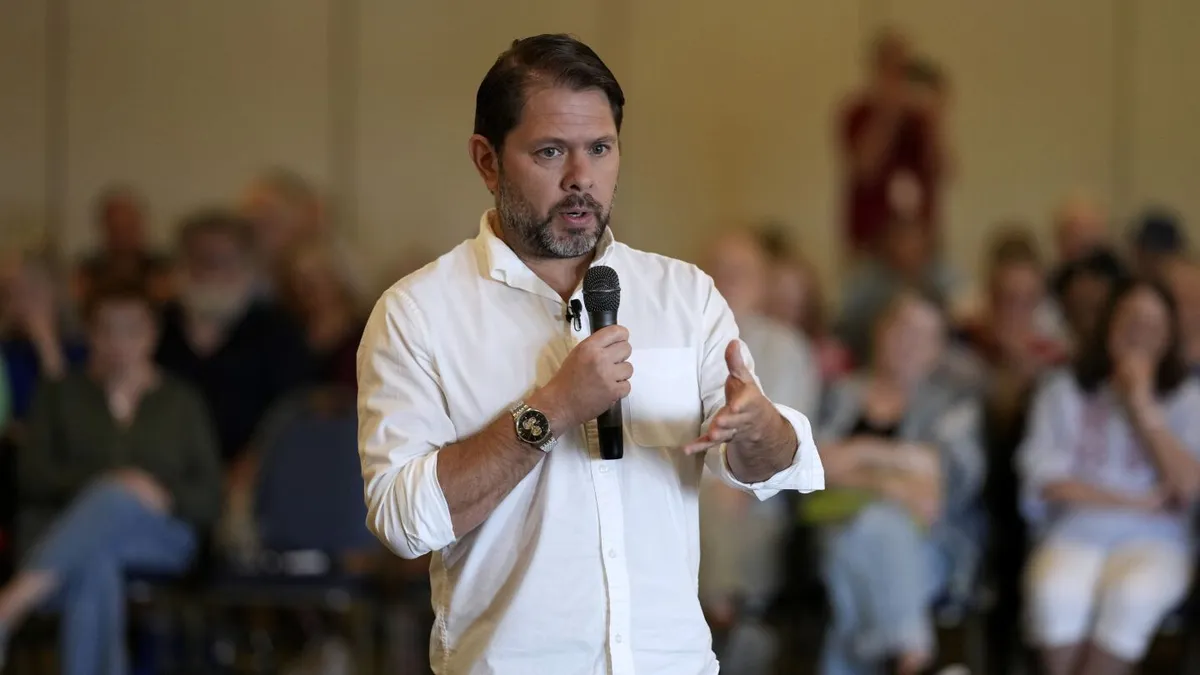
On Saturday in Davenport, Iowa, Sen. Ruben Gallego, a first-term Democrat from Arizona, energized a crowd of hundreds during a town hall meeting, where he vehemently criticized the substantial tax legislation championed by President Donald Trump. Gallego asserted that the Republican-backed bill would likely result in making “America poorer and sicker.” His optimistic event starkly contrasted with a recent town hall held by Nebraska Republican Rep. Mike Flood, where he faced significant backlash from constituents.
In the wake of last year's electoral defeat, Democrats have been seeking a unified strategy to counteract the assertive tactics employed by Trump during his second term. This month, they have markedly shifted to a more aggressive stance, particularly against the tax bill, which has become a rallying point for the party. “I think this bill is helping Democrats see clearly what’s at stake with the future of protections for so many regular Americans,” stated Pete Wernimont of Waterloo, who traveled 140 miles to attend Gallego's event. “I just hope they are there when it really matters a year from now,” he added, highlighting the urgency felt by many constituents.
While some Republicans in secure districts are attempting to promote Trump’s legislation, the general advice from GOP leaders has been to maintain a low public profile, particularly noticeable during the August recess following the bill's enactment. Democratic activists are mobilizing efforts to highlight what they perceive as the political risks associated with this legislation for Republicans, especially as the midterm elections approach.
At the town hall, Gallego conveyed a powerful message to the assembled audience of approximately 300 attendees, who frequently applauded and cheered. “This is the galvanizing moment that’s happening because Democrats now understand, we’re the people that fight for the middle class and the working class of America,” he told reporters prior to the event. He emphasized that this moment serves as a critical turning point for the Democratic Party in articulating their commitment to protecting the interests of everyday Americans.
Among the attendees was Alexandra Salter, a physician's assistant from Davenport, who expressed deep concern about how the bill would adversely affect healthcare services. “I came here because I work in health care and this bill will hurt health care,” she said, reinforcing the sentiment that many professionals are beginning to voice their opposition to the legislation.
The atmosphere at Gallego's town hall sharply contrasted with Rep. Flood's meeting in Lincoln, Nebraska, where an even larger crowd of about 700 expressed their discontent with the tax bill, particularly focusing on its detrimental effects on Medicaid. The legislation, which passed without any Democratic support in both the House and Senate, proposes significant cuts to the health care program, including new work requirements for many beneficiaries. This has raised alarms among various demographics, particularly those relying on federal assistance.
Ann Ashburn, a retired executive from Aurora, Nebraska, shared her own experience of attending Flood's meeting, motivated by similar frustrations that brought Wernimont to Iowa. “I think the momentum could have been much greater had we been better organized,” she remarked, indicating a widespread desire among constituents to express their discontent.
As the political landscape shifts, Republicans will need to navigate the implications of this tax legislation carefully if they hope to maintain their foothold in Congress leading into the 2026 elections. A recent poll from the Associated Press-NORC Center for Public Affairs Research revealed that about two-thirds of U.S. adults believe the new law primarily benefits the wealthy, with approximately 60% indicating it would harm low-income individuals.
Gallego's trip to Iowa also included a stop at the Iowa State Fair, where he aimed to enhance his visibility in a state that has historically played a vital role in the Democratic presidential nominating process. With an eye toward the 2028 primaries, Iowa Democrats are eager to reclaim their position at the forefront of the electoral landscape.
Other prominent Democrats, such as Rep. Alexandria Ocasio-Cortez from New York, have also been active in Republican-held districts, voicing opposition to the tax bill. Ocasio-Cortez recently participated in an event in New York’s 21st District, represented by Republican Elise Stefanik, where she highlighted the bill's concerning Medicaid provisions. Furthermore, Vermont Senator Bernie Sanders is scheduled to hold rallies in Republican districts in North Carolina, focusing on the impacts of Medicaid cuts and their consequences for rural healthcare facilities.